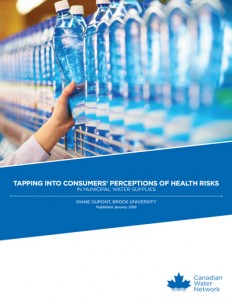Tapping into Consumers' Perceptions of Health Risks in Municipal Water Supplies
Principal Investigator - Diane Dupont, Professor, Brock University

Challenge
Previous research into the public’s views about tap water safety revealed that almost a quarter of respondents feel their tap water poses at least a minor health risk. Furthermore, a large number of respondents indicated that they regularly purchase bottled water for home consumption because of health concerns.
This project positioned Canada to become a leader in the area of consumer preferences and perceptions about water quality. Focusing on the gap between perceived drinking water risks and actual health risks, the project examined the implications of this gap, as well as the factors that explain the development of the average consumer’s risk perceptions. This improved understanding would help researchers develop tools and methods that communicate health risks more effectively.
Project
The first phase of the project involved analyzing data on monthly bottled water spending and in-home filtration systems in order to describe the extent to which consumers purchase tap water substitutes. A survey was then used to quantify the perceived health risks associated with tap water. Responses were combined to create an instrumental variable that was compared with expert opinions to define a “perception gap”.
The researchers studied the influence of socio-demographic variables, such as age and income, on consumer risk perceptions using a stated preference survey, evaluating approximately 500 households from across Canada. This investigation was complemented by focus group discussions that examined how the use of different types of wording, information, and graphical representations of health effects affect risk perceptions. This information was then provided to water supply managers to delineate how best to communicate the safety of municipal water systems.
Outputs
The project resulted in five different types of outputs:
- Academic papers for presentation at water specialist and environmental economic conferences and publications in peer-reviewed journals
- Reports, presentations, and benefit value data for Health Canada/Statistics Canada’s programs that require knowledge of what people are willing to pay for better water quality
- Information materials and workshops for water supply managers and local watershed management groups to illustrate how to communicate information about water quality
- An “environmental scorecard” of relevant environmental indicators that consumers can use to assist them in thinking about water quality issues
- Short “briefing notes” suitable for publication in local newspapers/magazines to disseminate project results to a more general audience
Outcomes
- Informed decision making related to quantity and quality of future water supplies, as the researchers examined what consumers want from their tap water and how willing they are to spend money on tap water substitutes, like bottled water.
- Determining the demand for bottled water has implications for long-term investment in local water services, since bottled water often comes from different watersheds, which increases the trans-boundary movement of water among watersheds. For example, the reported data can assist in evaluating which watersheds have high water demands and water transfers. As well, information about consumers’ water choices can be used in cost benefit analyses of sustainable infrastructure investment decisions and provide input to watershed management planning.
- Another key outcome of the project was to provide water supply managers with explanations of water purchase behaviour, which could then be used to target education programs and communication efforts on water quality and health risks.





